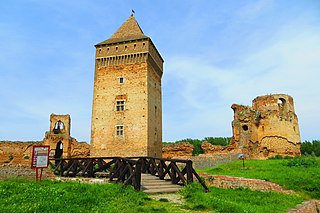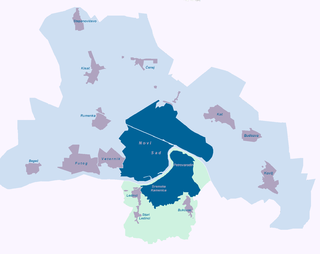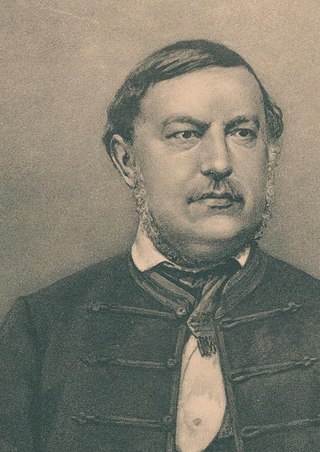
Novi Sad is the second largest city in Serbia after the capital Belgrade and the capital of the autonomous province of Vojvodina. It is located in the southern portion of the Pannonian Plain on the border of the Bačka and Syrmia geographical regions. Lying on the banks of the Danube river, the city faces the northern slopes of Fruška Gora and it is the fifth largest of all cities on the Danube river. It is the largest Danube city that is not the capital of an independent state.

The South Bačka District is one of seven administrative districts of the autonomous province of Vojvodina, Serbia. Geographically it lies in the southern part of Bačka and northern part of Syrmia. According to the 2022 census results, it has a population of 607,178 inhabitants. The administrative center of the district is the city of Novi Sad, which is also the capital and the largest city of the Autonomous Province of Vojvodina.

The City municipality of Novi Sad was one of two city municipalities which formerly constituted the City of Novi Sad from 2002 to 2019. The city statute adopted in 2019 abolished both of Novi Sad's city municipalities. According to the 2011 census results, the municipality had a population of 307,760 inhabitants, while the urban area had 250,439 inhabitants.

Novi Sad is the capital of the Serbian province of Vojvodina, and second largest city in Serbia.

The Cultural Center of Novi Sad is a cultural institution in Novi Sad, Serbia. It is located in Katolička Porta, in the Stari Grad district of central Novi Sad. It was founded by city council.
Goran Švonja is a Serbian footballer who plays as a defender with Veternik.

David "Daka" Popović was a Serbian engineer, army officer, architect, journalist, historian, and a politician who served as the first Ban of Danube Banovina, Minister of Land Reform and a senator of Senate of Kingdom of Yugoslavia.

The Great People's Assembly of Serbs, Bunjevci and other Slavs in Banat, Bačka and Baranja or Novi Sad Assembly was an assembly held in Novi Sad on 25 November 1918, which proclaimed the unification of Banat, Bačka and Baranya with the Kingdom of Serbia.

Stevan Branovački was a Serbian lawyer, politician, mayor of Novi Sad, president of Matica Srpska and one of the founders of the Serbian National Theater.

The City Assembly of Novi Sad is the legislature of the City of Novi Sad, capital of Autonomous Province of Vojvodina in Serbia.

The Historical Archive of Srem in Sremska Mitrovica, Vojvodina, Serbia is the central archival institution responsible for collecting information about archival material in Srem District, administrative districts of Serbia overlapping with the historical region of Syrmia. The archive houses approximately 1,300 various collections from different aspects of life in the region of Syrmia, including economy, judiciary, education, administration, socio-political and religious organizations.

The Historical Archive of Belgrade is the primary institution responsible for preservation of archival materials in the city of Belgrade, capital of Serbia. The Archives collect documents from all 17 municipalities of Belgrade, spanning from the mid-18th century to the end of the 20th century. The institution was established by a decision of the executive committee of the People's Committee of the City of Belgrade of the People's Republic of Serbia in September 1945. The Archive preserves 2,580 fonds, totaling 13,000 linear meters of archival materials. This collection includes records from personal and family collections, as well as various societies, associations, and cultural organizations. It also includes records from educational institutions, healthcare, industry, the judiciary, administrative bodies, and government agencies.

The Historical Archive of Pančevo is the primary institution responsible for preservation of archival materials in the western and central parts of the South Banat District located in Pančevo, Vojvodina, Serbia. It is the primary archival institution for the municipalities of Pančevo, Kovin, Alibunar, Opovo and Kovačica. The achieve is the largest inter-municipal historical archive in Serbia. The archive houses 827 fonds and collections, with a total length of 8,840 meters, covering a period from the early 18th century to the late 20th century.

The Historical Archive of Bela Crkva is the primary institution responsible for preservation of archival materials in the eastern parts of the South Banat District located in Bela Crkva, Vojvodina, Serbia. It is the primary archival institution for the municipalities of Bela Crkva, Vršac and Plandište while the western and central parts of the district are covered by the Historical Archive of Pančevo.

The Historical Archive of Sombor is the primary institution responsible for preservation of archival materials in the West Bačka District and westernmost parts of South Bačka District located in Sombor, Vojvodina, Serbia. It is the primary archival institution for the municipalities of Sombor, Apatin, Kula, Odžaci and Bač. The archive was established as the regional archival centre in the Autonomous Province of Vojvodina in 1948 and today it houses 558 fonds and collections. It gained independent institution status in 1951 by the decision of the City of Sombor.

The Historical Archive of Kraljevo is the primary institution responsible for preservation of archival materials in northern and central part of the Raška District located in Kraljevo, Serbia. The archive is primarily covering municipalities of Kraljevo, Vrnjačka Banja and Raška.

The Historical Archive of Kikinda is the primary institution responsible for preservation of archival materials in central and eastern parts of the North Banat District located in Kikinda, Vojvodina, Serbia. It is the primary archival institution for the municipalities of Kikinda, Čoka and Novi Kneževac while the western Bačka parts of the district are covered by the Historical Archive of Senta. Historical Archive of Kikinda is housed in the palace of the District of Velika Kikinda which is today housing both the archive and the city museum.

The Historical Archive of Subotica is the primary institution responsible for preservation of archival materials in the North Bačka District located in Subotica, Vojvodina, Serbia. It is the primary archival institution for the municipalities of Subotica, Bačka Topola and Mali Iđoš. The archive holds 484 fonds and collections which contains 6 535, 77 shelf meters of archival materials.

The Historical Archive of Senta is the primary institution responsible for preservation of archival materials in western Bačka parts of the North Banat District and northernmost parts of the South Bačka District located in Senta, Vojvodina, Serbia. It is the primary archival institution for the municipalities of Senta, Bečej, Srbobran, Ada, Kanjiža while the remained of the North Banat District district is covered by the Historical Archive of Kikinda.

The Historical Archive "Ras" of Novi Pazar is the primary institution responsible for preservation of archival materials in southern parts of the Raška District and Zlatibor District located in Novi Pazar, Serbia. The archive is primarily serving municipalities of Novi Pazar, Tutin and Sjenica.






















